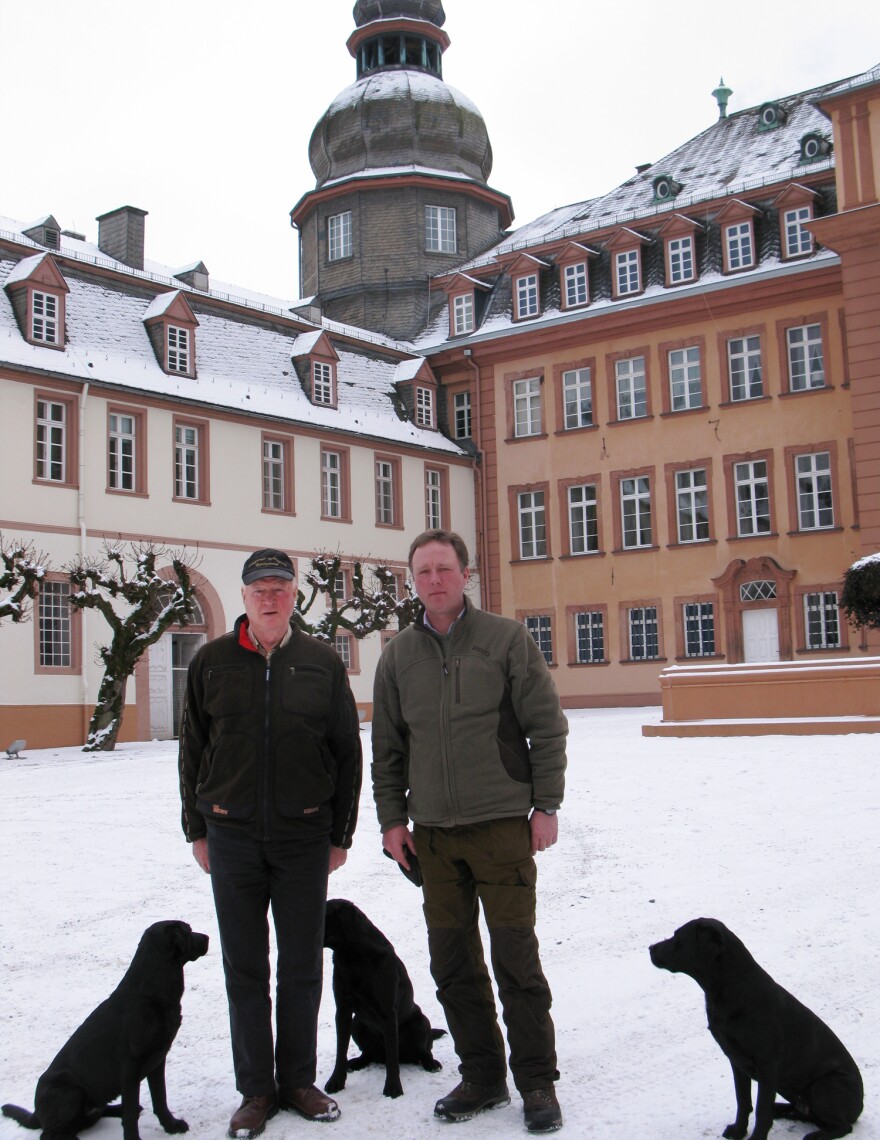A small herd of European bison will soon be released in Germany's most densely populated state, the first time in nearly three centuries that these bison — known as wisents — will roam freely in Western Europe.
The project is the brainchild of Prince Richard of Sayn-Wittgenstein-Berleburg. He owns more than 30,000 acres, much of it covered in Norwegian spruce and beech trees in North Rhine-Westphalia.
For the 78-year-old logging magnate, the planned April release of the bull, five cows and two calves will fulfill a decade-old dream.
But the aristocrat's neighbors aren't all thrilled about his plan to release wisents, which have been living in an enclosure on his property for three years. They are slightly taller than their American cousins and weigh up to a ton. Questions remain about who will foot the bill if the European bison damage property or injure someone.
"We were skeptical because we weren't given enough information," says Helmut Dreisbach, a cattle farmer and vice chairman of the Farmers' Association of Siegen-Wittgenstein. "How will the animals react? Will they stay in a particular area or will they move onto working farmland?"

The prince's estate manager, Johannes Roehl, says it's unlikely the small herd will move far beyond the 220-acre enclosure they currently live in. He adds that even if the animals do stray, they have vast swaths of uninhabited forestland to roam in.
Winning Over The Neighbors
Prince Richard blames much of the criticism on centuries-old rivalries between his Protestant family and Catholic neighbors.
Nevertheless, he and his son, Prince Gustav, say they realized the importance of winning over local residents. The younger prince says it was tough in the beginning.
"They made such trouble. I mean, there were public hearings with hundreds of people," the 44-year-old explains, adding, that the proponents "were nearly beaten up."
But the princes say most people have come around after extensive efforts to educate residents about their plans and their getting necessary government approvals.
The project receives the equivalent of $1.6 million in government subsidies, and local officials have put up street signs pointing tourists to a second wisent herd that Prince Richard has on display.
Bernd Fuhrmann, the mayor of Bad Berleburg, says he hopes the wisents will jump-start the village's flailing tourist industry.
"We know them from the old Western movies," he says. "My enthusiasm for these animals has grown. ... To experience them in the wild will be fascinating."
European bison are not the first animals Prince Richard has brought back to the region. His estate is rife with gray geese and ravens, which he says he reintroduced at the request of the German government. Herds of red and roe deer, as well as wild sheep and boar, also abound on his property.
Many of the animals on his land can be hunted, but others, like the bison, are off limits. Rows of antlers and horns hang on the prince's office wall.

Prince Richard says his passion for animals is one he's cultivated since his youth. It wasn't an easy childhood. He says American forces during World War II bombed his family home, adding a sarcastic, "Thank you very much."
After the war ended, Prince Richard says he and other youth would steal American soldiers' cigarettes for trade. He was shipped off to relatives in Sweden, where he developed his love for nature. He later studied forestry in college.
Prince Gustav says his father was determined to create animal-friendly habitats on their estate and enlisted his son's help.
"For 20 years we've been shoveling ponds," the younger prince says. "Now we both have bad backs. I think we shoveled tons of earth for fish and for the big black stork and for the kingfisher."
Hopes For Bigger Herd
In the U.S., efforts to reintroduce American bison have met with varying degrees of success. Clayton B. Marlow, a professor of rangeland science and management at Montana State University, warns that just as with American bison, keeping the German wisent herd moving will be paramount to ensuring it doesn't destroy habitat or become a nuisance to the community.
"We can't release either population onto a landscape and rub our hands with satisfaction and walk away," he says.
Ensuring they don't transmit diseases to local cattle or vice versa is also important, he adds.
The princes have been working closely with Polish scientists at the Warsaw University of Life Sciences to ensure the wisents are healthy and genetically sound.
That's where the official European bison registry is kept, showing that there are currently about 4,500 European bison in captivity.
Prince Gustav says the outcome they are hoping for is a herd or two of 15 to 25 animals. They and their project's managers will closely monitor the wisents and cull their numbers as needed.
"If it doesn't work we will have to take them away, but it will work," he says. "If we leave them alone it will work."
Copyright 2020 NPR. To see more, visit https://www.npr.org. 9(MDAxNDQ2NDAxMDEyNzU2NzM2ODA3ZGI1ZA001))






